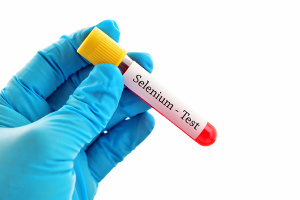Selenium and zinc improve survival in prostate cancer and other cancer forms
 Prostate cancer is the most common cancer form among men. In terms of existing therapies, there is room for improvement. According to a Polish study that is published in Nutrients, higher levels of selenium and zinc in the blood can improve survival. The study authors mention that these two nutrients also protect against other cancer forms.
Prostate cancer is the most common cancer form among men. In terms of existing therapies, there is room for improvement. According to a Polish study that is published in Nutrients, higher levels of selenium and zinc in the blood can improve survival. The study authors mention that these two nutrients also protect against other cancer forms.
Prostate cancer is most common in Western countries. In 2020, around 1.5 million men worldwide were diagnosed with the disease, and more than 375,000 died of it. Existing therapies for treating prostate cancer are considered to be rather good compared with available treatments for other cancers, and the five-year survival is approximately 83 percent in Europe and 97% in the United States. Nonetheless, there is room for improvement.
Diet, lifestyle, and lack of key nutrients are all important for the development of and the prognosis for the disease. It has been shown that selenium and zinc protect against prostate cancer. In the new study, the scientists looked at interactions between these two trace elements, which are not yet described in the scientific literature. The study also looked at optimal levels of selenium and zinc in the blood and how these nutrients affect survival among patients diagnosed with prostate cancer.
A total of 338 patients with prostate cancer were included in the study. They were recruited in Poland during the period between 2009-2015. Prior to regular treatment, blood levels of selenium and zinc were measured in the patients by using mass spectrometry (MS).
Afterwards, the patients were divided into four groups (quartiles), depending on how much selenium and zinc they had in their blood. The scientists then compared blood levels of selenium and zinc with patient survival in 2020. They found that those participants who had the highest levels of selenium and/or zinc in the blood had the highest survival rate. The scientists also found that those patients who had the lowest levels of both selenium and zinc in the blood were 21 times less likely to be alive after five years, compared with those patients who had the highest levels of the two nutrients. This shows that the combination of selenium and zinc has a positive synergistic effect on five-year survival in prostate cancer.
Selenium’s anti-cancer mechanisms and the body’s requirement
Selenium supports around 25-30 different selenium-dependent proteins (selenoproteins) that control a number of physiological functions such as the immune defense, thyroid function, etc. In addition, selenium is a key constituent of several important antioxidant systems (GPX) that protect cells and their DNA against damage caused by free radicals and oxidative stress. The new study mentions that selenium has been shown to improve survival of many cancer forms such as prostate cancer, breast cancer, lung cancer, bowel cancer, esophageal cancer, and malignant melanoma (skin cancer).
According to the current study, the average blood level of selenium in prostate cancer patients was 78 micrograms/liter, which is rather low. The lowest quartile had selenium blood levels that averaged 65 micrograms/liter, while the highest quartile averaged 83 micrograms/liter. Other studies suggest that optimal selenium levels in the blood should be above that and preferably around 120 micrograms/liter.
The reason why prostate cancer patients generally have low selenium levels may be that the agricultural soil in Poland and the rest of Europe contains very little selenium. Even those who eat a healthy and balanced diet may be challenged with regard to getting enough of this nutrient. Perhaps, the superior survival of American prostate cancer patients is linked to the fact that American farmland generally contains more selenium, and this is reflected throughout the entire food chain.
According to the New Nordic Nutrient recommendations, women and men should increase their daily selenium intake to 75 and 90 micrograms, respectively. Daily supplementation with selenium yeast (200 micrograms) can lower the risk of prostate cancer by up to 50 percent, according to a Danish study from Denmark’s Technical University and the NPC study (Nutritional Prevention of Cancer). The NPC study was headed by an American scientist named Professor Larry Clark.
Zinc’s anti-cancer mechanisms and the body’s requirement
Zinc supports well over 300 different enzyme processes and a few proteins (zinc fingers) that are needed by cells to activate their DNA at the right moment. Zinc also supports a powerful antioxidant (SOD) that protects cells and their DNA against free radicals and damage caused by oxidative stress.
Zinc is known to improve survival in many diseases, including prostate cancer, and cancer of the breasts, lungs, and esophagus. The new study showed that the average zinc content in blood of the prostate cancer patients was 845 micrograms/liter. The lowest quartile averaged 702 micrograms/liter, while the highest quartile averaged 944 micrograms/liter. We get zinc from meat, fish, shellfish, eggs, wholegrains, nuts, kernels, and beans. Zinc from animal sources has better absorption than zinc from plant sources. The recommended intake for zinc is around 10 mg daily. EFSA has set a safe upper intake level of 25 mg.
References:
Sandra Pietrzak et al. Correlation between Selenium and Zinc Levels and Survival among Prostate Cancer patients. Nutrients 2024.
Nordic Council of Ministers. Nordic Nutrition Recommendations 2023
DTU Fødevareinstituttet. Evidensgrundlaget for danske råd om kost og fysisk aktivitet. 2013
Clark LC et al: Effects of Selenium Supplementation for Cancer Prevention in Patients with Carcinoma of the Skin. Journal of the American Medical Association: 1996
TIP! See also the related articles
Search for more information...
- Created on .








